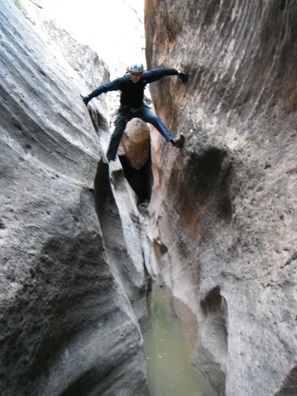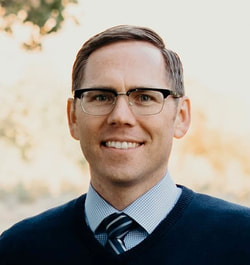|
I was interviewed by USU Extension Sustainability last month and asked to describe a typical day in the life as an Extension Agent. I also discussed my educational programs, thoughts on what sustainability means to me and why I love living in southern Utah. Q1. You wear many hats in Extension, including 4-H, Community Development, and Small Business Development, among others. Could you give us a snapshot of what a day in the life of an Extension educator in Washington County is like?
No day is like another. I'm dedicated to scheduling specific work at specific times. For example: My mind is most fresh in the early morning after 40-60 minutes of cross training, this is the time I devote to creative endeavors like writing, budgeting, problem solving and studying/learning in my home office. I use technology to effectively utilize my travel time during commutes to the office or meetings throughout the community. I use a hands-free LG wireless Bluetooth headset to have Siri text and call clients, make notes to myself, send voice memos, review my calendar and to-do list. I make most of my phone conversations while I am in the car. If I'm not on the phone, I'm listening to a podcast. If I get a phone call at the office I will go on a walk around the building, I don't like sitting and talking. I really don't get a whole lot of phone calls. Most of my communication with clients and 4-H staff is via texting on Slack, Facebook Messenger, Twitter, Snapchat and Google Hangouts Chat. My USU colleagues mostly email and text. I use Zoom when collaborating with eXtension colleagues in other states. More and more I'm using Zoom to communicate with local clients, it's convenient and saves them a trip to my office. I use doodle.com to schedule meetings with multiple people. It saves time going back and forth trying to find a meeting time that works. I avoid all regularly scheduled meetings. I don't believe in meeting just to meet and I don't like feeling tied down. When I do need to schedule a meeting, I plan economic development meetings in the morning and 4-H meetings in the afternoon or occasionally in the evening. I avoid most meetings by collaborating with colleagues and clients via docs in Google Drive. Effective collaboration eliminates the need for most meetings. When I'm at the office working I do everything I can to stay on the offense. I stick to my prioritized to-do list and turn off email and my phone so I don't let someone else dictate my schedule and priorities. I check email at 12:00pm and 4:00pm. Here's a snapshot of a normal day: 05:00 - Wake up, get ready for cross-training, read a book chapter 05:45 - Cross-training 06:45 - Creative time, grant writing, online course learning 07:45 - Breakfast with family, get ready for work 08:30 - Drive to office or meetings with clients, stakeholders, colleagues. Listen to podcast or make phone calls, prioritize to-do list and review calendar with digital assistant 09:00 - Arrive at work or meetings. Focus on developing economic development and eXtension programs, scheduling and lining out educational events, collaborating with volunteers. Working my to-do list. 12:00 - Check email, phone calls, text messages. Respond, make calls. I don't eat lunch or take a lunch break. 01:00 - Plan 4-H activities, work with staff on preparing for next leadership retreat, coding or robotics event, afterschool programs, horse or livestock shows. 04:00 - Check email and phone calls again. Respond to any questions or pressing issues. 05:00 - Drive home. Listen to podcast or make phone calls to clients, stakeholders, colleagues. Prioritize my to-do list and review calendar with digital assistant for next day. 06:00 - Dinner and family time. 09:00 - Go to sleep. This is all based on a normal office day when I don't have to travel out of the county or state for a 4-H activity or professional association conference. When I have evening meetings, I will go into the office later in the day. Things don't always workout that well, often I have early morning and evening meetings the same day. On days like that I just suck it up and work the long day. When I'm out of town at a 4-H retreat or professional conference I will work from sun up to sun down. I consider it an opportunity to get ahead on various work projects so I can spend more time with family when I get home. Q2. What are some major programs you are working on? I am constantly developing my 4-H STEM Education and Leadership programs. I have the largest youth robotics program in the state, consisting of 53 clubs. In my economic development programs I'm planning events like Southern Utah Code Camp, Startup Weekend St. George and the Washington County Economic Summit. I'm on the board of Leadership Dixie and I evaluate the Launchpad coding internship program. I also lead a national educational technology learning network for eXtension. They buy out 50% of my time which allows me to hire assistants to help deliver my educational programs and attend meetings on my behalf. Q3. You are based out of St. George, UT. What is it that you love about that place? I think southern Utah is the most beautiful place on the planet. I fell in love with the area as a youth when my family would take vacations here to explore the national parks. I really love the dry, hot desert. I can't stand cold or snow. I enjoy canyoneering and mountain biking as well, these are sports I can do year round in Washington County. Q4. What does sustainability mean to you? Is there a different word you like to use? To me sustainability means stewardship. Just like I am a steward of my family, I feel like I'm a steward for my community and environment. Are there any sustainability initiatives in St. George that most of us in the state might not know about? I belong to an incredible team that facilitates the Color Country Natural Resource Camp in Panguitch, Utah. We take high school students to the outdoors and teach them hands science for a week. We're very intentional about teaching sustainability and conserving our natural resources. Q5. You are working with Roslynn Brain of USU Extension Sustainability and others on an Extension Climate Science Essentials initiative. Could you describe what it is you are doing with that project? Currently, we are creating a massive open online course (MOOC) specifically geared towards Extension educators about climate change. The tentative title is "Extension Climate Science Essentials." The goal of this course is to (1) build a knowledge base about climate change within Extension. Once a large enough base of Extension professionals completes this short course, we would then create a community to crowdsource ideas and (2) reach a consensus on how to best serve our clients. After a consensus was reached, the community would divide into special-interest teams and work together across county/region/state lines to (3) create tools necessary to help clients. This model currently being developed in Utah could be one that is replicated or adapted nationally with the support of eXtension. Q6. Why is living sustainably important to you, personally? I seek to do my part in preserving southern Utah's natural resources for my children and future generations. I'm living in the shade of the trees planted by the incredible pioneers who settled my community. I owe it to them to only take what I need to live now, without jeopardizing the potential for people in the future to meet their needs.
0 Comments
Leave a Reply. |
Paul Hill, Ph.D.I design, plan, and evaluate economic development programs for Utah State University. Archives
September 2022
Search this site:
|


 RSS Feed
RSS Feed
